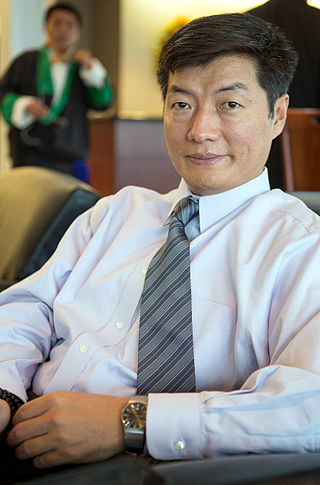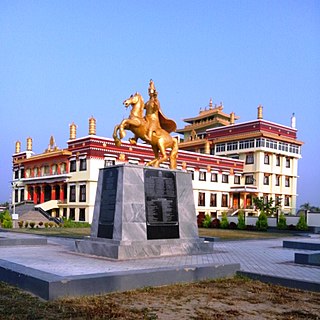Related Research Articles

The Central Tibetan Administration is the Tibetan government in exile, based in Dharamshala, India. It is composed of a judiciary branch, a legislative branch, and an executive branch, and offers support and services to the Tibetan exile community.

The Tibetan independence movement is the political movement advocating for the reversal of the 1950 annexation of Tibet by the People's Republic of China, and the separation and independence of Greater Tibet from China.
Free Tibet (FT) is a non-profit, non-governmental organisation, founded in 1987 and based in London, England. According to their mission statement, Free Tibet advocates for "a free Tibet in which Tibetans are able to determine their own future and the human rights of all are respected."

The International Campaign for Tibet (ICT) is a non-profit advocacy group working to promote democratic freedoms for Tibetans, ensure their human rights, and protect Tibetan culture and the environment. Founded in 1988, ICT is the world's largest Tibet-related NGO, with several thousand members and strong bases of support in North America and Europe. On March 15, 2018, the ICT completed 30 years of service to the Tibetan community and received a video message from the Dalai Lama. ICT also released its new logo. An event was also held in the United States Congress on March 6, 2018 to mark the event with Congressional leaders Nancy Pelosi, Ileana Ros-Lehtinen, Jim McGovern, ICT Chairman Richard Gere, Representative Ngodup Tsering and ICT Board Member Tempa Tsering making remarks.
The Tibetan sovereignty debate concerns two political debates regarding the relationship between the Chinese state and Tibet. The first debate is about whether or not the various territories which are within the People's Republic of China (PRC) that are claimed as political Tibet should separate themselves from China and become a new sovereign state. Many of the points in this political debate rest on the points which are within the second debate, about whether Tibet was independent or subordinate to China during certain periods of its history.

The history of Tibet from 1950 to the present includes the Chinese annexation of Tibet, during which Tibetan representatives signed the controversial Seventeen Point Agreement following the Battle of Chamdo and establishing an autonomous administration led by the 14th Dalai Lama under Chinese sovereignty. Subsequent socialist reforms and other unpopular policies of the Chinese Communist Party led to armed uprisings, eventually assisted by the CIA, and their violent suppression. During the 1959 Tibetan uprising, the 14th Dalai Lama escaped to northern India for fear of being captured by Chinese forces. He formed the Central Tibetan Administration and rescinded the Seventeen Point Agreement. In 1965, the majority of Tibet's land mass, including all of U-Tsang and parts of Kham and Amdo, was established as the Tibet Autonomous Region. Tibetans suffered along with the rest of China during the Great Chinese Famine and the Cultural Revolution under episodes of starvation, religious repression, destruction of cultural sites, forced labour, and political persecution. US-China rapprochement in the 1970s saw an end to Washington's support for Tibetan guerillas. Amid broader reforms across the country, China adopted policies to improve conditions in Tibet. Since the 2000s, it has invested heavily in the region but generated controversies due to the sinicization of Tibet. Human rights abuses remain a concern especially where it comes to freedom of religion and political prisoners.

The 1959 Tibetan uprising began on 10 March 1959, when a revolt erupted in Lhasa, the capital of Tibet, which had been under the effective control of the People's Republic of China (PRC) since the Seventeen Point Agreement was reached in 1951. The initial uprising occurred amid general Chinese-Tibetan tensions and a context of confusion, because Tibetan protesters feared that the Chinese government might arrest the 14th Dalai Lama. The protests were also fueled by anti-Chinese sentiment and separatism. At first, the uprising mostly consisted of peaceful protests, but clashes quickly erupted and the Chinese People's Liberation Army (PLA) eventually used force to quell the protests. Some of the protesters had captured arms. The last stages of the uprising included heavy fighting, with high civilian and military losses. The 14th Dalai Lama escaped from Lhasa, while the city was fully retaken by Chinese security forces on 23 March 1959. Thousands of Tibetans were killed during the 1959 uprising, but the exact number of deaths is disputed.

Tibetan Uprising Day, observed on March 10, commemorates the 1959 Tibetan uprising which began on March 10, 1959, and the Women's Uprising Day of March 12, 1959, involving thousands of women, against the presence of the People's Republic of China in Tibet.

The 14th Dalai Lama, Tenzin Gyatso, full spiritual name: Jetsun Jamphel Ngawang Lobsang Yeshe Tenzin Gyatso, also known as Tenzin Gyatso; né Lhamo Thondup; was born on the 5th day of the 5th month in the Wood-Pig Year of the Tibetan lunar calendar, July 6, 1935 in the Gregorian calendar. The incumbent Dalai Lama is the highest spiritual leader and head of Tibetan Buddhism. Before 1959, he served as both the resident spiritual and temporal leader of Tibet, and subsequently established and led the Tibetan government in exile represented by the Central Tibetan Administration in Dharamsala, India. The adherents of Tibetan Buddhism consider the Dalai Lama a living Bodhisattva, specifically an emanation of Avalokiteśvara or Chenrezig, the Bodhisattva of Compassion, a belief central to the Tibetan Buddhist tradition and the institution of the Dalai Lama. The Dalai Lama, whose name means Ocean of Wisdom, is known to Tibetans as Gyalwa Rinpoche, The Precious Jewel-like Buddha-Master, Kundun, The Presence, and Yizhin Norbu, The Wish-Fulfilling Gem. His devotees, as well as much of the Western world, often call him His Holiness the Dalai Lama, the style employed on his website. He is also the leader and a monk of the Gelug school, the newest school of Tibetan Buddhism, formally headed by the Ganden Tripa.

Lobsang Sangay is a Tibetan-American politician in exile who was Kalon Tripa of the Tibetan Administration in India from 2011 to 2012, and Sikyong of the Central Tibetan Administration in India from 2012 to 2021.

The Tibetan diaspora are the diaspora of Tibetan people living outside Tibet.
The 2008 Tibetan unrest was a series of protests and demonstrations met by excessive force, focused on the persecution of Tibetans, in the buildup to the 2008 Summer Olympics in Beijing. There was a mixture of outrage and understanding from leading figures abroad.

Lodi Gyaltsen Gyari Rinpoche, Kasur Lodi Gyari or "as he is universally known to the Tibetan-speaking world, Gyari Rinpoche" was a Tibetan politician, and journalist who served as the 14th Dalai Lama's special envoy to the United States. Exiled to India in 1959, he was also the executive chairman of the International Campaign for Tibet.

The International Tibet Network, established in 2000, is a global coalition of Tibet-related non-governmental organisations campaigning to end the China's occupation and human rights violations in Tibet, and restore rights to the Tibetan people. Its purpose is to maximise the effectiveness of the worldwide Tibetan Freedom Movement. The Network works to increase the capacity of individual member organisations, develops coordinated strategic campaigns, and encourages increased cooperation among organisations.
Human rights in Tibet has been a subject of intense international scrutiny and debate, particularly since the annexation of Tibet by the People's Republic of China. Before the 1950s, Tibet's social structure was marked by inequality and described as a caste-like system or, controversially, as serfdom. Severe punishments, including permanent mutilations of body parts, were common, although capital punishment was banned in 1913. Muslim warlord Ma Bufang caused widespread destruction and deaths in Amdo which is northeast of Central Tibet.
The Tibetan Centre for Human Rights and Democracy (TCHRD) is a Tibetan non-governmental nonprofit human rights organization.

The Tibet Post is an online publication founded by a group of Tibetan journalists with the primary goal of promoting democracy through freedom of expression within Tibetan communities who are both within and outside of Tibet.

Protests and uprisings in Tibet against the government of the People's Republic of China have occurred since 1950, and include the 1959 uprising, the 2008 uprising, and the subsequent self-immolation protests.

Tibet Justice Center, is an American legal association founded in 1989 that advocates human rights and self-determination for the Tibetan people.
References
- ↑ Australia Tibet Council Urges PM to Encourage China to Begin Dialogue on Tibet Archived September 27, 2007, at the Wayback Machine ICT, 12 August 2003
- ↑ Tibet Council slams Govt's decision to snub Dalai Lama ABC, 20 May 2002
- ↑ Dalai Lama warns against trying to contain China Taipei Times 13 June 2007
- ↑ "United Nations General Assembly - Resolution 1723 (XVI)". 10 June 2007. Archived from the original on 10 June 2007. Retrieved 29 June 2024.